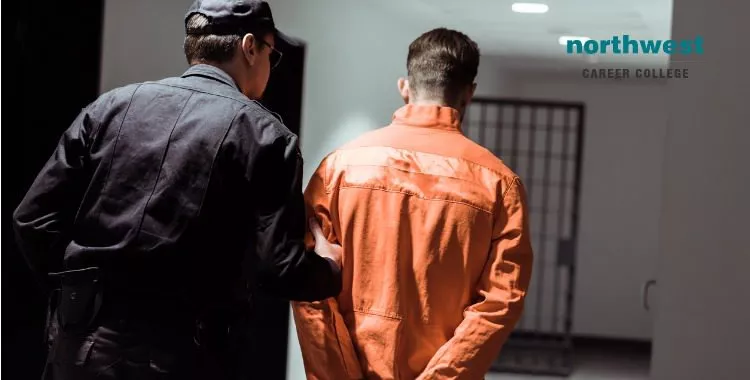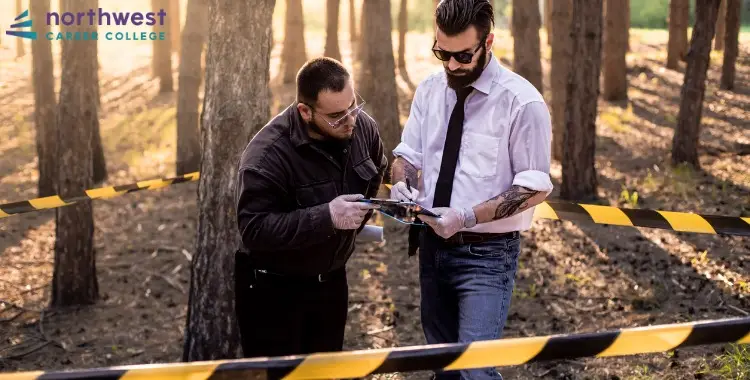A Day In The Life Of A Corrections Officer
- Criminal Justice
- February 25, 2025
- 3.5k views
- 5 min read

A lot what most people know about life as a corrections officer is built on what we see on TV. Shows like Orange is the New Black tend to lean on the idea that all corrections officers and corrupt or brutal, to increase the drama of the show. The reality is quite different.
So if your favorite Netflix show has gotten it wrong, then what is it really like to work as a correctional officer? Correctional officers make up a vital part of our criminal justice system, working to protect the inmates under their care and civilians alike.
Working as a correctional officer can be an incredibly fulfilling career, so if you are thinking of joining Northwest to study Criminal Justice and considering a career as a correctional officer, here are the facts you need to know.
Know More: How To Become A Correctional Officer In Nevada?
Table of Contents
Life of a Corrections Officer
What Do Correctional Officers Do?
Correctional officers are responsible for maintaining order and safety in our nations prison facilities. A correctional officer follows specific procedures put in place to keep the peace and ensure the safety of inmates, visitors, and other prison staff. One of the principal responsibilities of a correctional officer is to safely escort prisoners in and out of their cells and when they visit facilities outside the prison, such as medical centers or courtrooms.
Generally, a correctional officer typically focuses on preventing fights, escapes and other disturbances. This means patrolling on rounds, checking cells for evidence of security issues, hunting for contraband items and examining surveillance camera footage. Correctional officers are required to keep accurate and precise records, filling out records detailing anything that took place during their shift, especially any suspicious incidents.
Where Do Correctional Officers Work?
Most correctional officers work for the government and are employed by state or local prison facilities. Private prison companies also employ correctional officers. Correctional officers working in jails are more likely to encounter a broad assortment of inmates on rotation for short-term sentences and less serious infractions, while correctional officers in prisons generally deal with felons who are serving longer sentences.
Correctional officers are often required to work overnight, at weekends and during holidays. Part of the job is remaining alert and being prepared to take action no matter what time of day you happen to be on duty.
What Skills Does a Correctional Officer Need?
Strong interpersonal and leadership skills are a key part of being a good correctional officer. Since one of your main responsibilities will be to keep the peace in a place that can be rife with conflict. Correctional officers also need to be shrewd observers who have a strong understanding of other people’s motivations and reactions, as this can usually allow them to spot and head-off trouble before it begins.
Communication skills are vital as a correctional officer. Teams of officers need to communicate well to make sure they’re always in sync with the rest of their team, allowing them to work together to keep each other and the prisoners safe. Good communication skills also allow officers to accurately relay instructions and other information to inmates from a position of authority.
How Much Do Correctional Officers Earn?
The Bureau of Labor Statistics (BLS) reported that in 2017, the median annual wage for correctional officers and jailers was $43,540.
Across the different states, correctional officers can have quite the scale in salary, depending on where they are working and what kind facility they are working in. Officers employed by government facilities typically earn more than correctional officers employed in smaller state jails. At the top end of the pay scale, statistics from the BLS indicate that the top 10 percent of corrections officers brought home nearly $75,000 per year.
How Do You Become a Correctional Officer?
While most correctional officers need only a high school diploma to apply for the position, with specialized training given by their state or facility to get them started, there are plenty of advantages to earning a degree in Criminal Justice before pursuing a career as a correctional officer. Data from the BLS indicates that federal agencies typically prefer applicants with some college education.
A solid criminal justice program, like the one here at Northwest, can prepare you for work in the corrections environment and provide vital education on the country’s legal and justice systems which can significantly enhance both your resume and career advancement prospects.
Join Our Criminal Justice School Today!
Qualifying from our Criminal Justice School puts you in an excellent position to access a variety of employment opportunities as you look for one that suits your skills and interests. At Northwest Career College, our Criminal Justice instructors include licensed, practicing attorneys and degree instructors able to teach, not only the law but also to guide our students in the many ways a criminal justice graduate integrates into a Las Vegas legal profession.
As part of our Criminal Justice Program, you’ll visit courts, jails, meditation centers and more to experience first-hand the law in action which will make your criminal justice training applicable to the Las Vegas legal system. Northwest offers a flexible blended program with all criminal justice classes Las Vegas law classes taught on campus by an attorney and general education courses offered online. Our experienced instructors are on-campus to review and support your learning experience at all times.
Call us at (702) 403-1592 to speak to one of our enrollment team about joining our Criminal Justice Program today!



